

Content
|
COUNCIL OF INTERNATIONAL RELATIONSHIP
|
|
|
Mikhailova N.V., Burda M.A., Grishin O.E. State Migration Policy of Russia: Actual Issues of External Labor Migration
|
9
|
|
ACTUAL PROBLEMS OF MODERN SOCIETY
|
|
|
Mikhailova A.V. Relations between the State and the confessions: political analysis of notion
|
17
|
|
Pashigorova L.V., Ponomarenko B.T. Social aspects of federal project “Fight against cancer” realization
|
34
|
|
Yushin I.V., Voronin E.A. Evaluation of economic security and successful response to economic threats by methods of machine training
|
43
|
|
Kalinina N.S., Ryabininа A.I. Integration of culture objects into urban environment
|
51
|
|
REGIONAL STUDY
|
|
|
Gurushkin P.Y., Sandrachuk Y.F. Mediation as a global process of socio-political changes
|
57
|
|
Makhmudov A.S. The attitude of Russian youth to the elections - the reasons for political absenteeism
|
70
|
|
Salimgareeva Ch.N. «The best people» in the Third way doctrine of I.A. Ilyin
|
78
|
|
INTERNATIONAL RELATIONSHIPS
|
|
|
Biryukov S.V. Greece and Mitsotakis: time to collect stones?
|
93
|
|
Biryukov N.G., Lyubimov Y.M., Laburtsev A.S. On the issue of the effect Coronavirus in East Asian countries
|
102
|
|
Bogoslovskaya V.R., Kosyreva M.S., Dolgenko A.N., Murashko S.F., Rudakova S.V. English as a soft power tool in the modern global communication
|
111
|
|
REVIEW
|
|
|
Dotsenko M.Yu., Turova E.I. Man in a risk society
|
118
|
|
Abstracts
|
124
|
|
Authors
|
137
|
|
Requirements to materials submitted to the international publishing house "Etnosocium"
|
141
|
The study by the authors considers one of the important components of the migration policy of modern Russia - external labor migration. The prerequisites of migration attractiveness of Russia in the post-Soviet space, up-to-date statistical data of the Ministry of Internal Affairs of Russia are analyzed. The authors 'special attention is focused on identifying a set of reasons for the transformation of potential migrant workers into illegal immigrants. The levels of differentiation of external labor migration in accordance with Russian legislation have been identified, as well as certain international agreements that are currently instruments for the implementation of certain provisions of the updated Concept of Migration Policy of Russia.
Keywords: migration policy, migration, migration system, external labor migration, post-Soviet space, migration legislation, labor market.
Due to the fact that the political science of Russia studying the relations between the State and the confessions began to develop in Russia only in the post-Soviet period, it is quite recent and its vocabulary is not really determined. Today the relations between the State and religious associations are defined through different concepts; not all of them can be accepted as quite correct and commonly used.
Basing her reasoning on the constitutional principles of freedom of conscience and freedom of religion as well as on the principle of separation of religious associations from the State, the author makes a consistent analysis of the content of such concepts as «relations between State and Church», «relations between State and Islam», «relations between State and religious associations», «relations between State and confessions». Having identified the features of the latter concept, the author gives a brief description of its implementation in modern Russia.
Keywords: freedom of conscience, freedom of confession, post-Soviet period of Russian history, secular state, ideological diversity, religious organization, modern Russia, relations between State and Church, relations between State and Islam, relations between State and religious associations, relations between State and confessions.
The article discusses main results of first year of federal project “Fight against cancer diseases” realization in 2019, reveals social aspects of the implementation of measures included. Positive trends are discussed, such as updating of three – level system of cancer care system, increasing role of public organizations in decision making, renovation of standardization system for the quality of medical care. The social role of reference centers in improving oncological service in center and regions is characterized. Based on the foregoing, the prospects of revitalization of work on the fight against cancer are assed.
Keywords: social aspects, healthcare system, national project, society, oncological service, medical care, reference centers, professional communities, standards, clinical guidelines.
In the context of the dynamic complexity and nature of the market economy, the most important task is to monitor, analyze and ensure economic security at all levels of economic entities, from state, regional and ending with small enterprises. The proposed, popular and generally accepted methods for assessing economic security are contradictory, they are not amenable to mathematical formalization and standardization, and, consequently, intellectual automation. The criteria and methods for assessing economic security and safety presented in this work allow us to solve these problems. Due to the fact, that in a market economy, economic processes have a random nature, it seems natural to use a probabilistic approach to their analysis and forecasting, and for continuous monitoring and ensuring economic security - machine learning technology. The proposed methods and algorithms are implemented on the well-known libraries of the prediction languages Python and Scala.
Keywords: digital economy, security, information security, economic security, machine learning, artificial intelligence, economic and functional risks, investments, information, information space.
Cultural monuments require integration optimization to maintain and create comfortable living conditions not only for citizens, but also for the place or city. Maintaining the balance of old and new, this is how you can show harmony in a modern urban environment.
The article is devoted to the problems of preserving cultural heritage and national identification that are relevant in the era of globalization. The authors aimed to show the role of historical and architectural monuments in this process of integration into the modern urban space. The article also covered questions about the application of the integration method to various types of architectural monuments and the need for a comprehensive approach when working with historical objects. The article uses such research methods as analysis of existing domestic and international experience in this field and a systematic approach to solving the problem. As a result, the authors come to the conclusion that the integration method is necessary at the current stage of human development. This approach is defined as one of the most effective methods of preserving cultural heritage, which can have a balanced impact on both people and the city as a whole.
Keywords: monuments of cultural heritage, urban environment, integration of heritage in architecture, monuments of archeology in the city, historical buildings, historical objects of industrial architecture.
Mediatization as a global process of the socio-political changes.
At present besides distribution of communicational flows mass media are the independent actor in the politics implementation. Because of access to the general population, extensive possibility of impact, relative independence modern media not only can profoundly integrate into social reality but also change it. Analytics of the current status and functioning of public institutions is impossible without global processes of mediatization.
The main aim of the article is actualization and systematization of theoretical knowledges in the area of research mass media influence on socio-political life and also analytics of the conceptual framework including the emergence of new terms, categories and concepts.
Keywords: mediatization, mediation, medialition, mediatization of politics.
The development of a democratic society in Russia involves the study of the concept of absenteeism. In recent years, it has become extremely relevant to study the behavior of the youth electorate as the most mobile and non-standard social subject of politics. The author identifies key mechanisms for the development of absenteeism among Russian youth, and on the basis of the analysis made, suggests effective forms of youth activity development.
Keywords: absenteeism, elections, electoral technologies, youth, political motivation, electorate.
The article sets out Ilyin’s views on the process of Russia's transition to a new state identity, the key role in managing which is assigned to the “best people”. High requirements for future managers come from responsibility for the fate of national construction and the revival of the country after the fall of the communist regime. Ilyin’s thoughts on the importance of social formations and the national idea in educating the new eggmass are given. Based on Ilyin’s teachings, the author answers the questions: “On what basis is the new Russian manager nurtured?”, “How to identify the ruling minority?”, “What is the new national ideology?”, “What are the standards of the new electoral system that Ilyin offers?”.
Keywords: the third way, state ideal, national upbringing, the best people, elections, new Russian eggmass, rank idea, national idea.
The article considers the situation around Greece, as well as the state of affairs in the domestic policy of this country. The author examines the situation that developed after the transition of power in the country from the formal representative of the "leftist" forces Alexis Tsipras to the "center-right" Kyriakos Mitsotakis. The author generalizes the prerequisites for further stabilization of the situation in Greece due to the policy of the new government. We also consider the factors that determine the significance of Greece for Russia, as well as assess the prospects for the development of Russian-Greek relations in the current situation.
Keywords: Greece, Russia, European Union, crisis, stabilization, Russian-Greek relations, history.
Today our world was faced with a disease not previously encountered - coronavirus. Coronavirus has been detected in China and in order to prevent the spread of the epidemic around the world, the interaction of many countries is necessary, as well as the provision of necessary assistance to the carrier countries. Otherwise, the virus has a chance to spread around the world that could cast doubt on the existence of the human species. The article deals in detail with the social aspect, how racism is unconsciously manifested among people in relation to representatives of the Asian nation. The damage to the political sphere is studied, as well as an emphasis on a detailed consideration of economic losses. The priority of studying the problem is the East Asian region, since the focus of the virus was in China, Japan and Korea. Nowdays China is the country with the largest population, as well as one of the largest exporters and importers on the planet, this problem has affected the entire world, mostly East Asia. The article also discusses versions of the origin of the coronavirus on the territory of the people's Republic of China.
Keywords: China, coronavirus, epidemic, world community, global problem, interaction.
The article is devoted to the analysis of linguistic and extra-linguistic conditions ensuring the status of English as a global language in modern intercultural communication. Being the main instrument of Internet communication, global English influences the development of the modern Russian language not only on the level of vocabulary but also grammar. The strengthening of analyticism in the grammar system of Modern Russian is the result of the influence of English as a "soft power" tool in the modern global communication.
Keywords: linguistic globalization, global and subglobal languages, soft power policy.
Review and analytical article of the monograph. A brief analysis and analysis of the point of view.
Keywords: society, risks, points of view, view, speed.